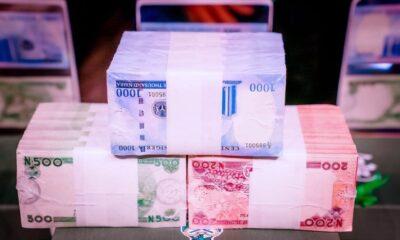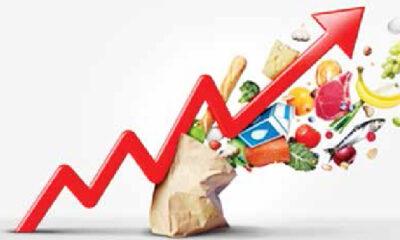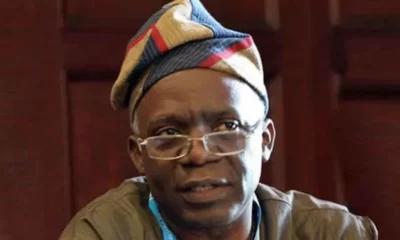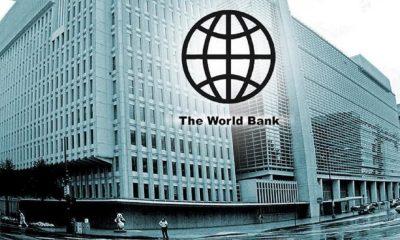Business
Inflation Pushes 5m Into Poverty, Wage Value Down 35%
Published
1 year agoon
By
Editor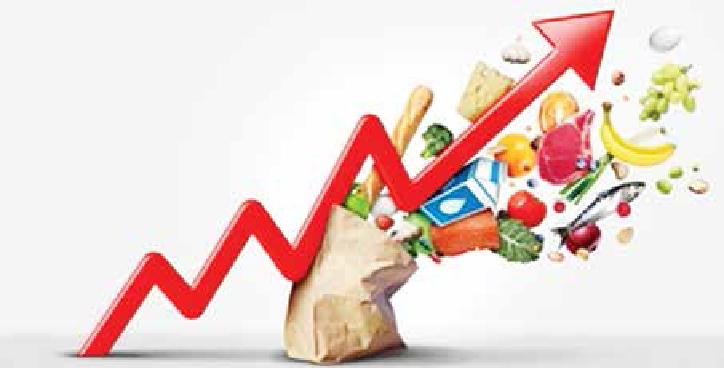
The World Bank has said that Nigeria is in a worsening situation, with economic performance becoming weaker as inflation persists.
The Washington-based bank said this in its newly released Nigeria Development Update, which was launched in Abuja on Thursday alongside the Nigeria Country Economic Memorandum.
The NDU report noted, “Nigeria is in a challenging and deteriorating economic situation. Nigeria’s economic performance has weakened since the previous Nigeria Development Update was published in June 2022 under the title of ‘The Continuing Urgency of Business Unusual’.”
The financial institution also cut Nigeria’s 2022 growth forecast to 3.1 per cent from a previous forecast of 3.8 per cent.
It said that the revision was due to slow economic growth in the third quarter from a year earlier, dragged down by the oil sector and a weak performance in other areas of the economy.
READ ALSO: Rising Inflation Drives Consumption Expenditure To N57tn
The bank further forecast growth to slow by 2.9 per cent in 2023.
The report read, “Nigeria’s economic output growth has slowed and the World Bank is lowering its growth projections. Real gross domestic product at market prices growth in the third quarter of 2022 was 2.4 percent year-on-year, on the back of a continued contraction in oil output (-22.7 per cent y-o-y) and slowing non-oil growth (4.3 per cent y-o-y, down from 4.8 per cent y-o-y in Q2 2022). The World Bank now projects that real GDP will grow by 3.1 per cent in 2022 and 2.9 per cent in 2023–24, 0.3 of a percentage point lower than the previous projections at the time of the June 2022 NDU.”
Wages lose 35% value
During his presentation of the reports, the World Bank Lead Economist for Nigeria, Alex Sienaert, noted that the Nigerian minimum wage, which was worth N30,000 in 2019, could be valued at N19,355 today.
This means that there had been a loss of 35.48 per cent value between 2019 and 2022 as inflation erodes Nigerians’ purchasing power.
Sienaert noted, “The cumulative inflation between 2019 and 2022 was 55 per cent.”
He said that the rising inflation had led to a slump in the purchasing power of Nigeria.
In the NDU report, it was noted that consumer price inflation had heightened, making it one of the highest in the world.
The report noted that although the CBN was making efforts to curb the rising inflation by increasing interest rates, its funding of fiscal deficit through the ways and means advances had made things difficult.
Multiple challenges
The report read, “The rate of consumer price inflation has surged and is currently one of the highest globally. The consumer price index, already increasing at a high rate, accelerated in 2022 through October, to be up 21.1 per cent y-o-y, a 17-year high.
READ ALSO: Nigeria’s Inflation Hits 20.52% In August
“High inflation has been persistent in Nigeria for the past two decades, but since 2019 inflation has increased substantially, driven by the multiple exchange rates and exchange rate depreciation in the parallel market, intensified trade restrictions, and the monetization of the public deficit by the Central Bank of Nigeria.
“In 2022, this has been exacerbated by the spike in global food and energy prices due to the war in Ukraine and global supply disruptions. Since May 2020, the CBN has responded by tightening monetary policy, increasing the policy rate by 500 basis points and increasing the cash reserve requirement by 500 bps. However, the disinflationary impact of these measures has been weakened by continuing monetization of the fiscal deficit, sector-specific subsidized credit provisions, and imported food and energy cost increases.”
The report also noted that Nigeria’s exchange rate policy settings are stifling business activity, investment and growth, and amplifying macroeconomic risks.
More 5m poor Nigerians
The World Bank also noted that inflation pushed five million Nigerians into poverty between January and October this year.
The report read, “As many as 5 million Nigerians have been pushed into poverty as a result of inflation in 2022. The World Bank estimates that between 2020 and 2021, inflation pushed about eight million more Nigerians below the poverty line, increasing the total number of poor people to about 90 million. Higher inflation in 2022 is estimated to have pushed an additional five million Nigerians into poverty between January and September 2022, mainly through higher prices of local staples, such as rice, bread, yam, and wheat, especially in non-rural areas.”
The Washington-based bank also said Nigeria’s economy was highly vulnerable to shocks.
It warned that if inflation and unemployment continued to trendhigh, insecurity would worsen in the country.
The report read, “Nigeria’s economy will remain highly vulnerable to both external and domestic shocks, and shocks will be exacerbated in the absence of urgently needed policy reforms to reduce inflation, increase fiscal revenues, and shift toward a market-responsive exchange rate.
“If inflation and unemployment remain high, this will exacerbate domestic security risks, which in turn could further reduce economic growth.”
According to the bank, high inflation had deteriorated in Nigeria since 2020, corroding citizens’ purchasing power and increasing poverty.
“Nigeria’s chronic, high inflation has worsened since 2020, eroding the purchasing power of Nigerians and increasing poverty. Since October 2019, Nigeria’s inflation has been persistently high. Inflation accelerated after the closure of Nigeria’s land borders in October 2019, and increased steadily throughout 2020 due to domestic supply constraints related to the COVID-19 pandemic. In 2021, at an average of 17 percent, inflation was above that of the previous four years and among the highest rates in the world.”
“During the course of 2020 and 2021, inflation was mainly driven by higher food prices, especially for staples such as bread and cereals, potatoes, yams, and other tubers, meat, fish, fruits, and oils and fats. The pace of price increases eased somewhat in 2021 as the economy reopened and domestic manufacturing and agricultural production increased, but inflation remained high at an average of 17 percent y-o-y,” the report added.
Nigeria’s headline inflation has continued to rise, hitting a new high of 21.47 per cent in November 2022 from 21.09 per cent in October 2022, according to the National Bureau of Statistics’ report released on Thursday.
The PUNCH observed that this was the highest rate in about 17 years.
According to the NBS, the reason for the increase year-on-year was the increase in the cost of importation due to the persistent currency depreciation and a general increase in the cost of production, including an increase in energy cost.
The month-on-month increase recorded was attributed to the sharp increase in demand usually experienced during the festive season.
The food inflation rate also increased to 24.13 per cent on a year-on-year basis, a 6.92 per cent higher compared to 17.21 per cent recorded in November 2021.
In a recent interview with The PUNCH, the Deputy-President, Lagos Chamber of Commerce, Gabriel Idahosa, raised concerns over the continued increase of the nation’s inflation rate.
He said, “We are more or less in a runaway inflation period where inflation rate is beyond control. So it is difficult for both the CBN and the rest of the economy to be able to adjust to any rate of inflation because we don’t know what the rate of inflation will be monthly.”
The Director General, National Association of Chambers of Commerce, Industry, Mines and Agriculture, Sola Obadimu said, “We all know the implication of higher inflation rates. It means everything is going up, and the prices are going up. And there are two things: either the dollar rate is going up or the naira is weakening, so the cost of input is going up.”
The Director, Centre for the Promotion of Private Enterprise, Dr Muda Yusuf, said that the rising inflation was a major cause for concern for stakeholders in the Nigerian economy.
He said this in a statement issued on Thursday regarding the November inflation rate announced by the NBS.
He said, “Like in many other parts of the world, the phenomenon of mounting inflationary pressures in the Nigerian economy is yet to abate. It remains a major cause for concern for stakeholders in the Nigerian economy.”
He added, “Over the last one year, the Nigeria inflation story has been a depressing one as reflected in the dynamics of all key price metrics.
“The key inflation drivers have not changed over the last few years. They include the following: the depreciating exchange rate, rising transportation costs, logistics challenges, forex market illiquidity, hike in diesel cost, climate change, insecurity ravaging farming communities and structural constraints to economic activities. Fiscal deficit financing by the CBN is also a significant factor fueling inflation through high liquidity injection into the economy.
“Tapering of monetary easing in the advanced economies is also driving imported inflation and the depreciation in the exchange rate.”
He urged the government to tame the rising inflation and asked the CBN to refrain from tightening the monetary policy.
READ ALSO: Inflation Hits 16.82%, Exceeds IMF’s 2022 Projection
Yusuf said, “Taming inflation demands urgent government intervention to fix supply side constraints in the economy. Tackling production and productivity constraints, fixing the dysfunctional forex policy, and reducing liquidity injection through ways and means funding of fiscal deficit are important.
“Meanwhile, the CBN should resist the temptation of further monetary policy tightening. The deployment of monetary tightening tools should be put on pause. The Nigerian economy is not a credit-driven economy which is why the tightening outcomes has been inconsequential as a tool to tame inflation.”
The former President of the Manufacturers Association of Nigeria, Mansur Ahmed, described the Federal Government’s attempt to rehabilitate refineries as wasteful.
He advised that the current refineries in the country be sold out to save the government revenue spent on its rehabilitation over the years.
PUNCH
You may like


Nigeria Set To Receive Fresh $2.2bn World Bank Loan – Edun


JUST IN: Nigeria’s Inflation Hit 31.70% In February – NBS


VIDEO: Reject IMF, World Bank Offers – Falana Cautions FG


Nigeria’s Poverty Reduced By Seven Per Cent – World Bank


99.9% Households Yet To Receive FG’s Cash Transfer – W’Bank


Economic Reforms: Nigerians Under Poverty Line Rise To 104m — World Bank

The Central Bank of Nigeria (CBN) started fresh and direct sales of US dollars at N1,021 per dollar to Bureau De Change operators.
Nigeria’s apex bank disclosed this in a circular signed by its Director of Trade and Exchange Department Hassan Mahmud.
“We write to inform you of the sale of $10,000 by the Central Bank of Nigeria (CBN) to BDCs at the rate of N1,021/$1. The BDCs are in turn to sell to eligible end users at a spread of NOT MORE THAN 1.5 percent above the purchase price,” the circular posted on its website read.
READ ALSO: Tinubu Unveils African Counter-Terrorism Summit
“ALL eligible BDCs are therefore directed to commence payment of the Naira deposit to the underlisted CBN Naira Deposit Account Numbers from today, Monday, April 22, 2024, and submit confirmation of payment, with other necessary documentations, for disbursement of FX at the respective CBN Branches.”
CBN’s move is coming as the naira is recording a slight depreciation against the dollar after weeks of gains.
In late March, the bank also sold $10,000 to each of the eligible Bureau De Change (BDC) operators in the country at the rate of N1,251/$1.
READ ALSO: Mixed Reactions Trail Video Of Couple’s Customised N200 Notes
Like in the most recent sales, it warned BDCs against breaching terms of the dollar sales, vowing to sanction defaulters “including outright suspension from further participation in the sale”.
The fortunes of the naira have fallen sharply since President Bola Tinubu took over in May. Inflation figures have reached new highs and the cost of living hitting the rooftops.
Nigeria’s currency slid to about N1,900/$ some months ago at the parallel market. But in recent weeks, it has gained against the dollar.
The Nigerian authorities have also doubled down on their crackdown against cryptocurrency platform Binance and illegal BDCs.
On March 1, the CBN revoked the licences of 4,173 BDCs over compliance failures.

Olusegun Alebiosu has been appointed as the Acting Managing Director/Chief Executive Officer of First Bank of Nigeria Limited (FirstBank Group), effective April 2024.
Alebiosu steps into this pivotal role from his previous position as the Executive Director, Chief Risk Officer, and Executive Compliance Officer, a position he held since January 2022.
Alebiosu brings to the helm of FirstBank over 28 years of extensive experience in the banking and financial services industry. His expertise spans various domains including credit risk management, financial planning and control, corporate and commercial banking, agriculture financing, oil and gas, transportation, and project financing.
READ ALSO: JUST IN: Access Holdings Names New Acting CEO
Having embarked on his professional journey in 1991 with Oceanic Bank Plc. (now EcoBank Plc.), Alebiosu has held several notable positions in esteemed financial institutions.
Prior to joining FirstBank in 2016, he served as Chief Risk Officer at Coronation Merchant Bank Limited, Chief Credit Risk Officer at the African Development Bank Group, and Group Head of Credit Policy & Deputy Chief Credit Risk Officer at United Bank for Africa Plc.
Alebiosu’s academic credentials further enrich his professional profile. He is an alumnus of the Harvard School of Government and holds a Bachelor’s degree in Industrial Relations and Personnel Management. Additionally, he obtained a Master’s degree in International Law and Diplomacy from the University of Lagos, as well as a Master’s degree in Development Studies from the London School of Economics and Political Science.
READ ALSO: Meet Newly Appointed Union Bank CEO
A distinguished member of various professional bodies, including the Institute of Chartered Accountants (FCA), Nigeria Institute of Management (ANIM), and Chartered Institute of Bankers of Nigeria (CIBN), Alebiosu is renowned for his commitment to excellence and ethical practices in the banking sector.
Beyond his professional endeavors, Alebiosu is known for his passion for golf and adventure. He is happily married and a proud parent.
With Alebiosu’s appointment, FirstBank of Nigeria Limited anticipates continued growth and innovation under his leadership, reinforcing its position as a leading financial institution in Nigeria and beyond.
Business
CBN Gives New Directive On Lending In Real Estate
Published
1 week agoon
April 17, 2024By
Editor
The Central Bank of Nigeria, CBN, has released a new regulatory directive to enhance lending to the real sector of the Nigerian economy.
The directive, issued on April 17, 2024, with reference number BSD/DIR/PUB/LAB/017/005 and signed by the Acting Director of Banking Supervision, Adetona Adedeji, signifies a notable shift in the bank’s policy towards a more contractionary approach.
In line with the new measures, the CBN has reduced the loan-to-deposit ratio by 15 percentage points, down to 50 per cent.
This move aligns with the CBN’s current monetary tightening policies and reflects the increase in the Cash Reserve ratio rate for banks.
READ ALSO: JUST IN: CBN Gov Sacks Eight Directors, 32 Others
The LDR is a metric used to evaluate a bank’s liquidity by comparing its total loans to its total deposits over the same period, expressed as a percentage.
An excessively high ratio may indicate insufficient liquidity to meet unexpected fund requirements.
All Deposit Money Banks are now mandated to adhere to this revised LDR.
The CBN has stated that average daily figures will be utilised to gauge compliance with this directive.
Furthermore, while DMBs are encouraged to maintain robust risk management practices in their lending activities, the CBN has committed to continuous monitoring of adherence and will adjust the LDR as necessary based on market developments.
READ ALSO: JUST IN: CBN Increases Interest Rate To 24.75%
Adedeji has called on all banks to acknowledge these modifications and adjust their operations accordingly. He emphasised that this regulatory adjustment is anticipated to significantly influence the banking sector and the wider Nigerian economy.
The circular read in part, “Following a shift in the Bank’s policy stance towards a more contractionary approach, it is crucial to revise the loan-to-deposit ratio policy to conform with the CBN’s ongoing monetary tightening.
“Consequently, the CBN has decided to decrease the LDR by 15 percentage points to 50 per cent, proportionate to the rise in the CRR rate for banks.
“All DMBs must maintain this level, and it is advised that average daily figures will still be applied for compliance assessment.
“While DMBs are urged to sustain strong risk management practices concerning their lending operations, the CBN will persist in monitoring compliance, reviewing market developments, and making necessary adjustments to the LDR. Please be guided accordingly.”

Three Electrocuted In Ogun Market

How Flight Engineer Saved Us From Disaster — Ex-DG, Bureau of Public Service Reforms

JUST IN: Four-year-old Boy Dies In Abuja School, Parents Suspect Foul Play
Trending

 Entertainment3 days ago
Entertainment3 days agoBridesmaids’ Dance At Wedding Causes Stir On Social Media [VIDEO/PHOTOS]

 Politics4 days ago
Politics4 days agoEdo Guber: Akoko-Edo PDP Leaders Meet In Igara, Describe Ighodalo, Ogie As ‘Perfect Match’

 News5 days ago
News5 days agoFoundation Advocates Empowerment Of Women, Youth In Nigeria

 Metro3 days ago
Metro3 days agoVIDEO: ‘UNN Lecturer’ Caught Pants Down With Married Student

 News4 days ago
News4 days agoOutrage As Chinese Supermarket In Abuja Denies Nigerians Entry

 News5 days ago
News5 days agoJapa: Types Of US Visa Available To Nigerians, Other Foreigners

 News3 days ago
News3 days agoIGP, Jonathan Disagree Over State Police

 News2 days ago
News2 days agoBREAKING: Dangote Further Crashes Diesel, Aviation Fuel Price

 Business4 days ago
Business4 days agoJUST IN: FirstBank Gets New MD/CEO

 Politics3 days ago
Politics3 days agoEdo Guber Final List : Group Knocks LP, Commends, INEC, Yakubu
